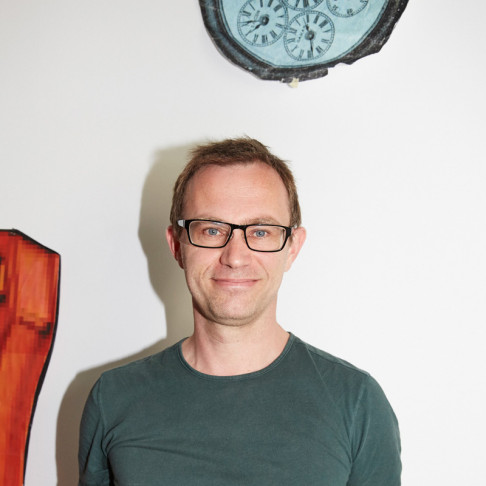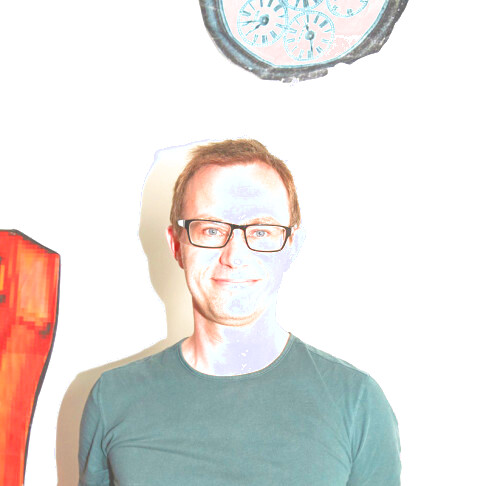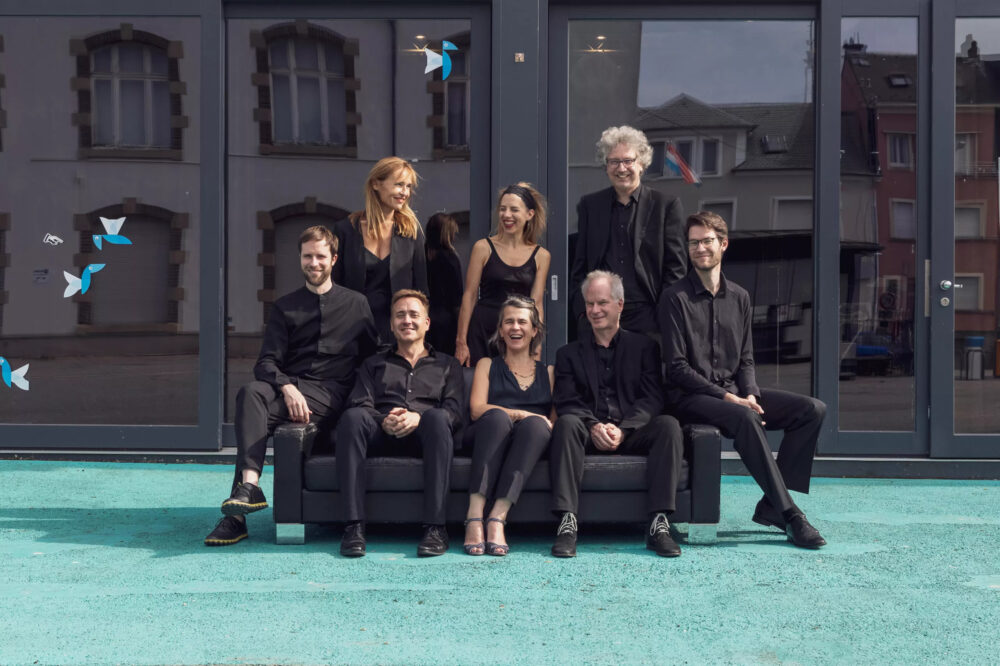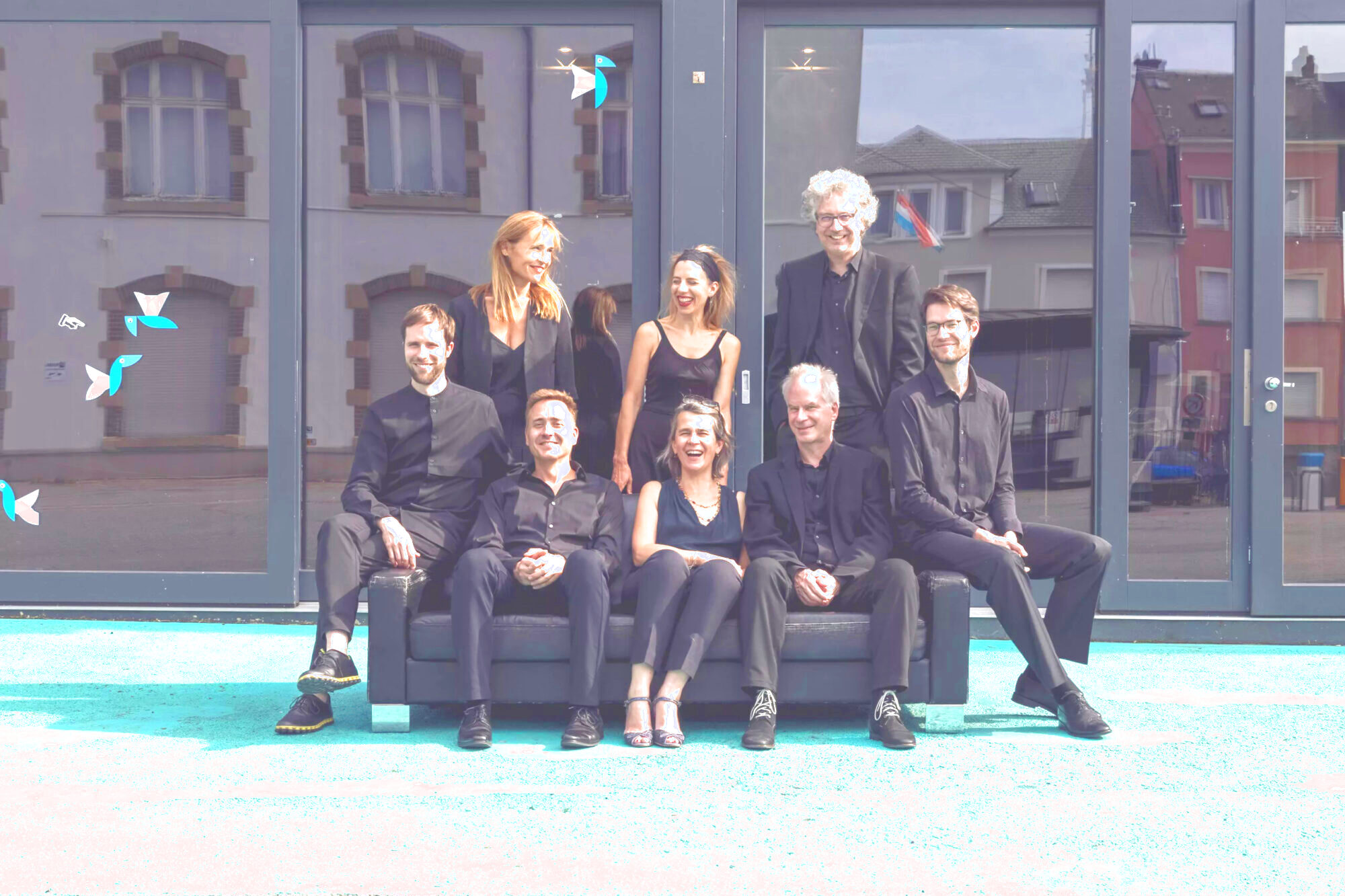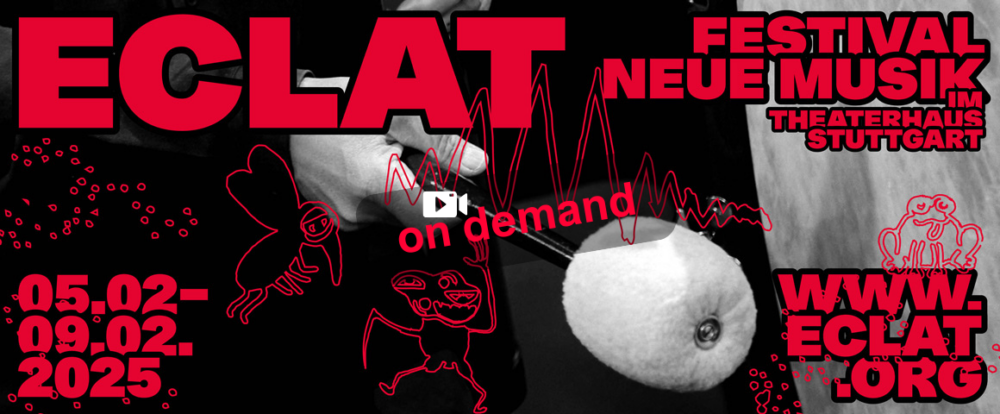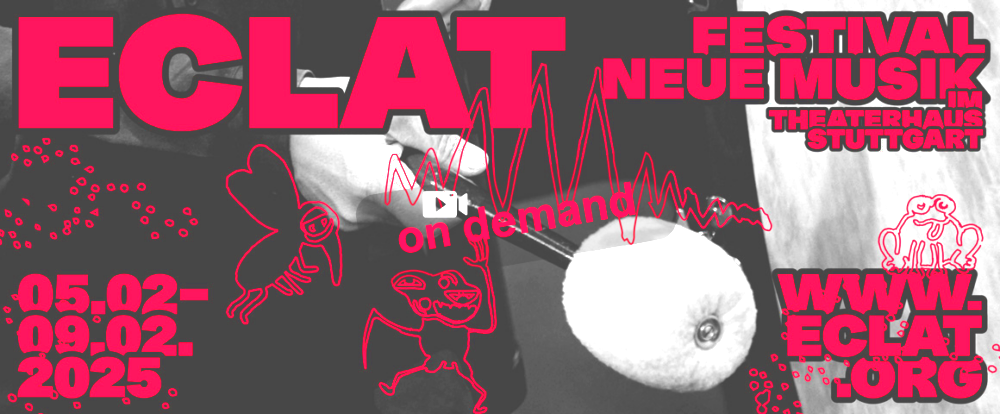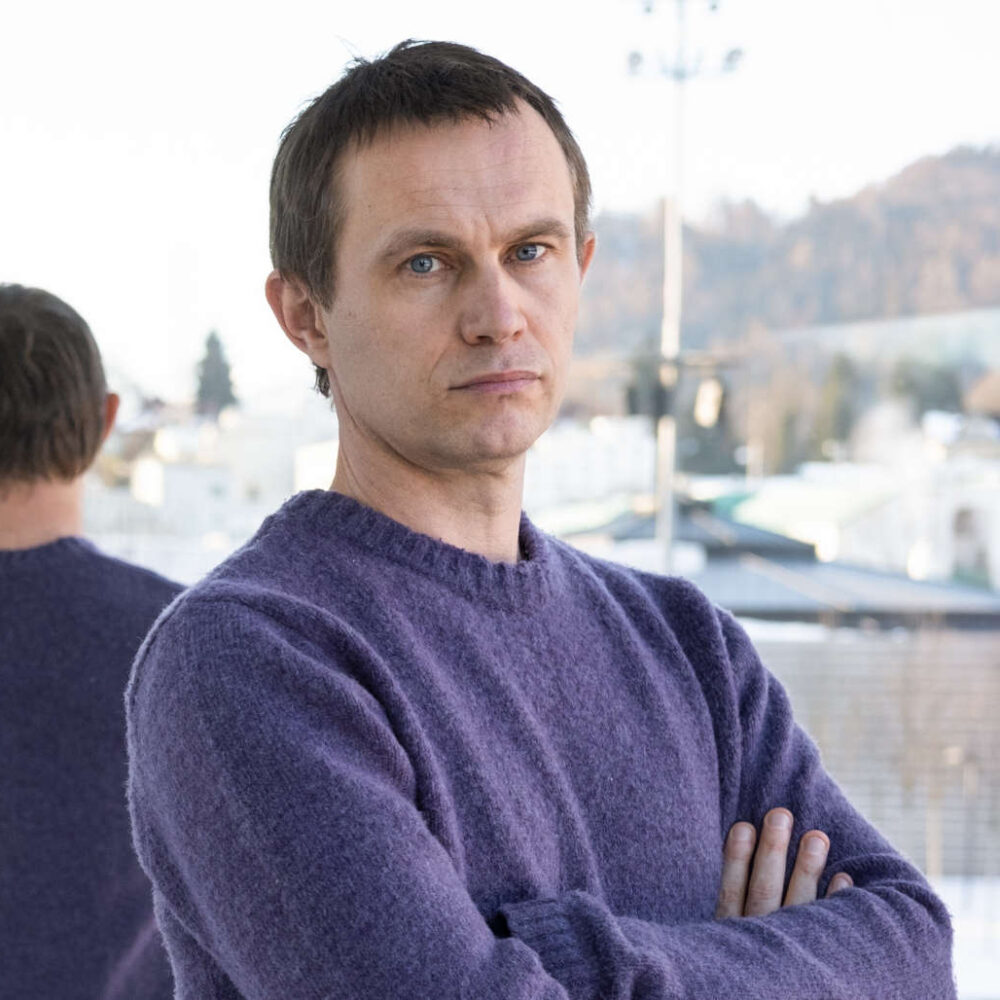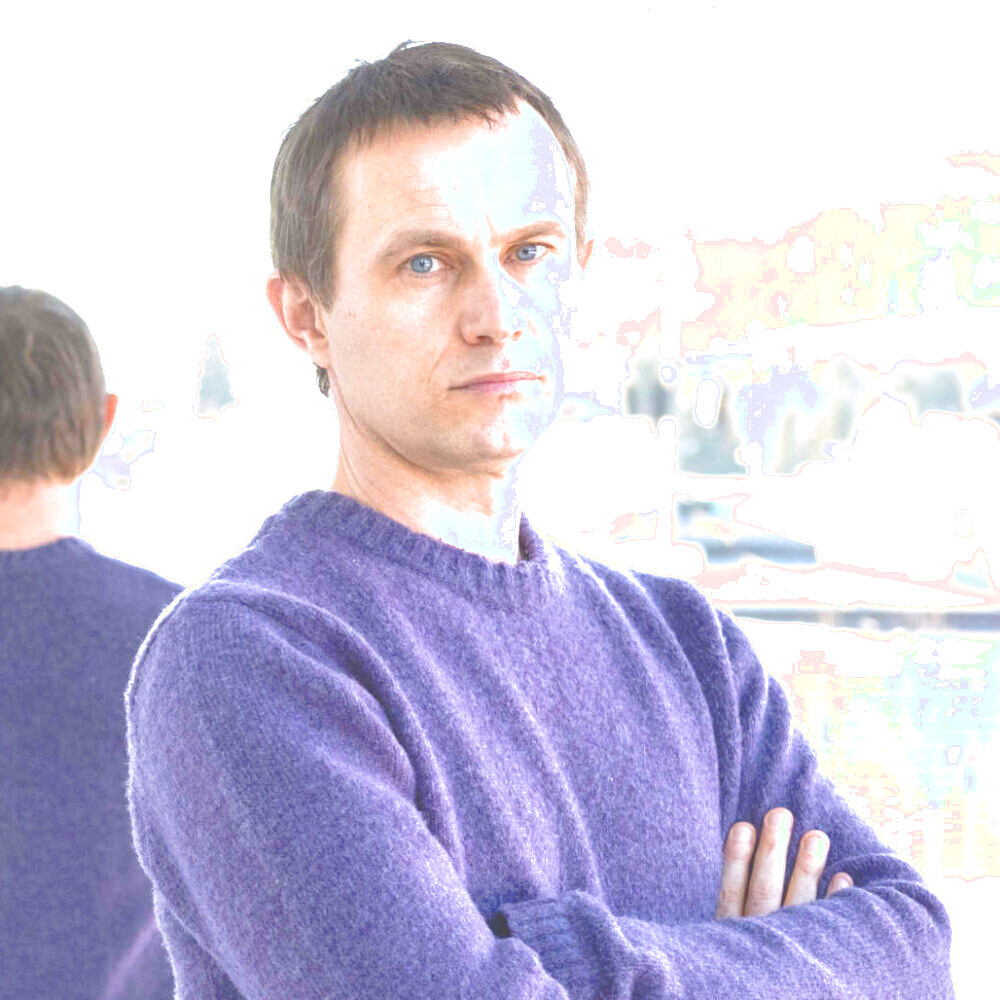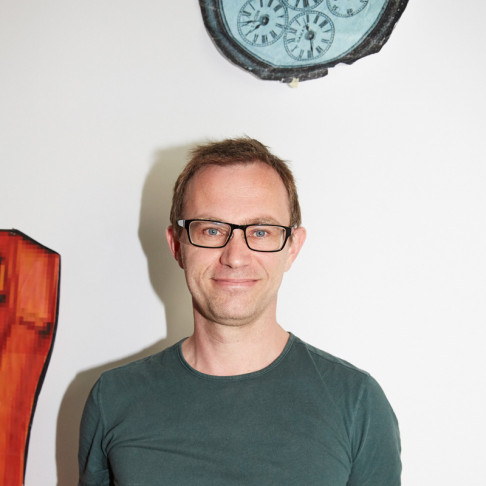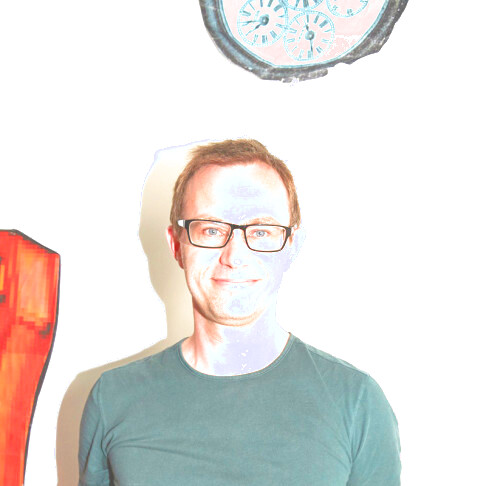Z:
François, first of all, I would like to ask you to introduce yourself and your musical activities. Where do you come from? Where are you based? What’s your professional focus?
S:
My name is François Sarhan. I’m a French composer living in Berlin, at the moment. I’m not only a composer. I think like a lot of my colleagues nowadays, I also stage shows, I also do videos, I conceive shows, and I have also directed some movies and constructed some set design for the movies, some of them with ensemble mosaik and some others all around. Then what is my activity? Mostly composing and music, as I said, but also trying to work on different topics that the music does not necessarily involve directly, such as the one which occupies Les Murs meurent aussi.
Z:
Next I would ask you to give us just some basic information about your work about Les murs meurent aussi, The Walls Also Die, as I would put it in English, which will be presented at ECLAT 2025. What’s the genre of this piece? And what’s the set up or lineup?
S:
The genre of Les Murs meurent aussi would be described as best as a documentary music theater. Music theater because it involves stage activity, which is not purely musical, but which is also acting and text and videos and interaction between all these layers and documentary because the topic and the expense of the topic is, I would say, 90% based on preexisting material, even in the words or the images or the action on stage, a reenactment of existing material in reality.
Z:
And how did the idea come about? How did it come into life? What motivated you to compose it?
S:
So the first idea, the first project, the first concept which arose the show was the beginning of the war between Ukraine and Russia in 2022, depending on how you want to word it, the invasion of Ukraine by Russia, or the special operations from the Russian side. And this war was a trigger for me to question myself on how could the composer react or give a certain testimony or perspective on this conflict. And the reason was that I felt uncomfortable going on with my usual projects when such an important event was happening at the door of Europe, which would show me or which would tell me that I am either indifferent in my art to this kind of things or I wouldn’t be able to assess it or to testify it or to talk about it. This raises a lot of questions because it’s certainly not the the role of the artist to stop the wars in the world. And thank God, because we are not able to do it. Or maybe unfortunate, actually, because maybe we wouldn’t be able to do it, I don’t know. But in any case, we are not entitled to do it and we are not able to do it. And the other problem is, of course, the question of neutrality. By neutrality, I mean, what kind of perspective I as a French can take on the conflict between people from Russia and Ukraine or indeed what I’m saying is not neutral because some people say it’s a conflict between the Russian politics and Ukrainian people or Russian nation against Ukrainian nation and so on and so forth. So this is already a very, very complex question. But I didn’t feel like I could escape from it. I didn’t feel honest continuing with writing music, indifferent to this conflict.
Z:
So lets’s get deeper somehow into the content related dimension of the work. You’re speaking a lot about walls and borders. Also, in a more general way, you speak about other conflicts in the world going on at the moment, but maybe you can just describe it more generally. What does the idea of walls in our life represent in a positive and a negative sense?
S:
When I started working on the project, it appeared very quickly that the strict scene of the war between Russia and Ukraine was not manageable because it was too sensitive for both parts and the testimonies I wanted to use or the people I wanted to put on stage were too complex and too sensitive to treat as a theater plane. So I decided to enlarge the theme to the more general question of borders, walls and the human conflicts which are created by these borders and walls. Not so much on the political perspective, of course. The political or war perspective is in the background always. But it’s not what I’m discussing. I’m discussing or I’m trying to testify the impact on everyday life or on individuals, on certain people. So I looked for individual stories, true stories from people all over the world who had to face very clearly, very simply the changes of borders or the constructions of walls or the destruction of walls, whether it would be, for instance, the Berlin Wall or the Jerusalem wall or the border between Ukraine and Russia, where people suddenly would wake up in another country and so on and so forth. So the topic of the show became more, of course, we are still talking about the conflict between Russia and Ukraine, because it’s part of it and it’s a recent one, is one we know, and it’s a lot about borders, of course. But then around this central topic, I gathered a lot of stories which are parallel, which are sometimes very known, maybe not the stories themselves, but at least the contexts are very known, especially in Germany, e.g. the story of the son and his mother from East Berlin, for instance, or another one, which is probably much less famous, about the companies who are working internationally on the constructions of walls or devices for walls, for planes and so on. Some people make billions working on this, changing borders. It’s a sort of subcategory of military industry.
Z:
Would you say something about the sources of texts, which sources of visuals and also of music you are referring to in Les Murs meurent aussi? How did you compositionally deal with all of those different sources?
S:
So let’s first talk about the sources of the text, it’s only found material or materials that I found on the web, which I try to respect as much as possible, not changing words, sometimes only cutting when it was for some reason redundant, because I wanted to have the voice of the people talking and not my literary interpretation of the same. For the images, the material is 100% taken from YouTube because I wanted to present material which is real in the sense that it’s in the world and that people who can attend the show can also find it on the web. It’s not a secret. It’s not an art product which would be made up or invented, it’s not a mockup. Everything is available for everyone. And after the show, when the show was performed, every time I had people who came and who couldn’t believe that what they saw was real and they said, how did you come up with this idea of biodegradable bullets? And I told them: Well I know degradable bullets is a concept which exists in the American army. The American army really decided that their bullets should be biodegradable, not to alter the nature on the war fields. I didn’t invent this cynical concept. I didn’t create it. I just show and I just stage it. When it goes to the music, I had to face difficult choices because with the disparity and the contrasts in the material, whether visual or textual, I needed a music material, which would unify the whole thing and which would not be illustrative. So I took basically two sources, one is to reenact the music of the YouTube videos in order to go on, for instance, with the one from the Elbit company which is an advertisement for radars against air missiles which attack planes. And I transcribed the music so that the music is really going strictly with the film. But otherwise what I did was to transcribe the speech of one person who told his personal story. And this transcription of the pitch gave me a sort of melody and this melody, I use it, let’s say, I don’t know what would be the best metaphor, but either like a cantus firmus was coming on again and again and again with a lot of variations and a lot of material put on the top of it. Or maybe in another metaphor it would be the Stockhausen formula type where this little material, this melodic phrase, would explode and be present in all the dimensions of the piece. It gives a sort of unity, although it’s a unity maybe more for the composer than for the listener. But when one knows that it’s always based on the same kind of melodic attempts to the text, one can hear that this melody comes back.
Z:
So maybe we can go more into detail concerning the performative design. You’re very much known for your fantastic music theater work and very unconventional performance approach, and I would like to ask you what your audience could expect in terms of the performative interaction of all the musicians being involved, the three performers speaking, singing, acting and the musicians that are on stage?
S:
For me always the first question in this kind of production is why do we need the music? And if we need music, why do we need musicians on stage? What do musicians have to do with the topic and therefore, what will there be? I’m always confused by music theater where there’s a separation between the musicians who play and the stage, which is active, because it’s a sort of a contract we should have, saying this is part of the stage. It tells us something, but the other part of the stage tells us something else and we have to swallow it. So what I did in this show was to interview the musicians and ask them if in their life, in the direct surrounding they had border, war or conflict stories. And as it’s often the case, it happened that all of them had stories about borders, and some were very gruesome and some were more friendly, more pacific, maybe. And I use them in the theatrical context of a talk show where all the musicians present their story as if they would be invited in a talk show to present their last book, or they would be interviewed because they did something exceptional. So each musician has a little music number where they speak and they talk about themselves or their family or their grandfather who died in the war and so on and so forth. This material is a sort of red line in the show so that we understand that when the musicians are enlightened and when they play, they’re going to tell us a story. But it is also very important for me that they are not actors. So when they speak, they speak in a way which is the same than you or me. We speak more thinking of what we want to say than where we look or the way we are. So it gives a feeling of fragility, which is important because it’s not intended to be staged. The staging of this documentation of these interviews is musical, but not cynical. The musicians don’t move with it, they just play and speak. When they speak, of course, they touch some subjects such as the Russian border or bombings of their house and things like these. And this is a trigger to start another chapter where we go by association to another topic such as the people who have to walk 2000 kilometers to find their grandmother who disappeared or all the people who have to cross the same wall every day in order to go to work. So the beginning of the show is very simple, but little by little it opens up doors. And if I can say, it opens possibilities. And we go from one story to another and then the stories sort of intertwine with each other and come back and so on.
Z:
So obviously you are very critical with today’s sender and reception habits that have become established through the use of digital and social media. In what specific ways are you compositionally seeking to arise and hold the attention of your listeners? What is dramaturgical design like and what does hold this multitude of sometimes exaggerated and almost grotesque activities together on stage?
S:
To answer the first part of your question. For me the most important is the subject of the show, and that we should be able to relate to what the show is about and how the show is running. I have no taste for abstract assumptions and even less for the ones who deal about music itself. I always find music about music, music theater about music theater as a sort of self-indulgent procedure for artists to talk about themselves. And it’s exactly not what I’m interested in. I want that people who are not into new music or new music theater could attend this show and receive something which belongs to their understanding of the world or misunderstanding of the world, whatever. So that’s why all the activity is intended to connect to something that we know, either because the stories are very clear and understandable and told by the person who made the experience. Or because when it’s not the case, then it’s argumented and presented as facts. For instance, I present material about Aleksandr Gabyshev who is a man in Siberia, who walked through whole Siberia. He had the plan of going to Moscow and make an exorcism on Putin to save Russia. This story, which is completely unbelievable for us Westerners, is funny on the one hand and it’s tragic, it’s very strange. And all these layers are interesting to me. I didn’t want to put it in one particular aspect, but on the contrary, to explore all these layers. So I think it’s funny because of course he is presented as a grotesque character, but he’s also very tragic. His ending is tragic and also his intention is tragic and the impact he had by gathering followers, by making interviews and so on tells us a lot about the democratic principle in general, the use of law, what is unlawful, what is in the law, and how people perceive it, and what is the need of the Russian people at the time. So it’s all these layers which I want to put on stage. There is no aesthetic purity, the aesthetic never comes first.
Z:
I understand. So maybe we can have some focus on the musicians that are involved. Maybe you can tell us something about the United Instruments of Lucilin and the three performers that are on stage. And how did you collaborate during the gestation period of the piece? As you told me, they were involved from the beginning…
S:
The ensemble was involved from the beginning and we decided to do this show together. We did the first show in 2022 in Luxembourg, and because this collaboration was so exciting, we decided to do another project together, which came to be this. Then I needed more performers in the sense of people who would be really dedicated only on text and in singing and so on. And my first idea was to try and gather two Russian performers and two Ukrainian performers on stage. That showed to be impossible because of the nature of the conflict and the tensions. And so I found a Ukrainian dramaturg living in Berlin, Maria Buzhor, and by discussing with her about the nature of the project, she came to suggest to me to work with Julia Lwowski, who is a stage director. She’s directing operas and music, theater and so on, but she’s also a performer and she’s also Ukrainian. And I wanted from the beginning to work with Daniel Agi, who is the flute player of the Cologne based ensemble hand werk. He speaks German, English, French and Arabic, because he’s originally from Syria. And of course, for me, all these languages and these backgrounds Ukraine, Germany, Syria and me, France and Luxembourg of the musicians, that was in my line of stories. So there was also this group of people who contributed to the modification of the scene because it was not only Russian people or Ukrainian people on stage, it was a mix of a lot of nations, who I wanted to collaborate in a way or another on the levels of text and the stories. Of course, it became obvious for me that they should talk about their own countries and their own situation. So on stage we have Julia Lwowski, Daniel Agi as main performers and Maria Buzhor, but also for some numbers the musicians–who then are just musicians–will be telling their personal stories, as I said before.
Z:
What would you say, what could your audience ideally take away from a performance of your piece? You spoke about offering a space for reflection and mourning, but maybe you can say it in your own words again, or just refer to this statement that you gave.
S:
Personally, I’m very sensitive to the personal stories of people who have to endure the problems of political decisions taken. In Europe we are probably used to have a certain respect for the politics because our history has taught us, that we are citizens, who are in control or even in charge of what the government does. Of course, we don’t control everything and we don’t know everything which is happening. But we certainly have a democratic system which is fairly functional. But there are a lot of countries which are either not democratic at all or barely democratic, but the people have the same life, except that they have much bigger problems because of these dysfunctional systems. It’s the case typically in Russia, but also in Syria in Israel or in Gaza, whatever you want, you name it, you find the same kind of people having immense problems. And instead of presenting them always from the side of the news, which is a sort of globalizing perspective on things we don’t master at all, I always want to have the light on the people who have no name. And the people who have no name on stage get the voice. And then we can listen to them and we can share and then we can attend maybe the individual problems and the individual tragedy and above them is running the madness of the world. That’s how I would describe the construction of the show.
Z:
Did you have any response from audiences after the performances in Strasbourg?
S:
Well, in general, as I said, people don’t believe that the world is so fucked up. For instance, no one who is not informed can believe that biodegradable bullets exist. No one can believe that you can find on YouTube advertisements for weapons. No one would believe the story of Aleksandr Gabyshev. This guy who proclaimed himself shaman and went through Siberia to exercise Putin. No one can believe this. I didn’t know it was going to be like this is that people unfortunately found it funny because they thought it was made up stories. Some of them are clearly real, but for some people… It showed me that we don’t take full dimension of how fucked up this world is. We don’t realize it, probably because if we were to realize it, we would have serious questions, serious problems.
Z:
And go mad somehow.
S:
Yeah, yeah, go mad.
Z:
My last question I think is almost needless to ask, as it became clear from what you have said already, in how far your music is motivated by your view of the world. But what keeps you going on? What are your hopes related to the work you’re doing? You said we believe that we are not in charge of changing the world in the political sense, if we are on the artist side. But still, what is your hopes connected to your work?
S:
I don’t have any hope connected to my work at all. I think what I do is hopefully bring some intellectual dimension, some emotion, some impression of the best. And again I don’t think artists have a lot of power in this respect. I think artists have very, very little strength. I think it’s a big shift in our society. I think after the war we used to have a sort of symbolic and mystical power, where, to go back to Stockhausen, he really thought that there was a way to, if not change the world, at least to modify the mentalities and to inject some great changes in the mentalities of people. But I don’t think it’s possible anymore because the society became used to adapt and doesn’t really confront itself with what the artists want to propose. The entertainment is very much invading, what we are doing.
Z:
So at least I would say that what you are doing is a wonderful act of solidarity in a way, just reaching people and helping them to somehow get to accords with these very difficult situations. Maybe as a last point in our interview: How would you, in a very few words, encourage a potential audience not to miss the presentation in Stuttgart?
S:
Les Murs meurent aussi is a music theatre dealing with the subject of borders, wars and personal conflicts, which we all are confronted with, whether we are from Europe or from Africa or from the Middle East. It involves personal stories coming from the musicians, personal stories coming from the performers and videos which are taken on YouTube. Everything is true, everything is real. The show combines funny and grotesque elements with tragic stories. The show is involving musicians and actors and singers in order to provide various perspectives on the topic of borders. Everything is put on stage just to surprise us, sometimes making us sad, but also sometimes hopefully amused about the state of the world.
Interview and editing: Michael Zwenzner
